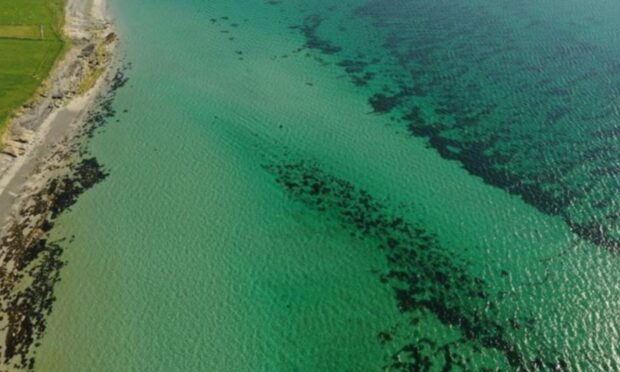Environmental researchers have identified the full extent of a large seagrass bed in the southern waters of Papa Westray using drones.
In a joint operation between Scottish charity Open Seas and Greenpeace UK researchers mapped the seagrass bed to be approximately 3,223,440 square feet.
The team used an aerial drone to survey the seabed around Vast Ness while the crew on board the Sea Beaver deployed an underwater remotely operated vehicle.
Seagrass is the only flowering plant in the marine world and was once a common habitat around UK waters.
It provides essential nursery grounds for a wide array of marine life including seahorses, which can be found as far as the Northern Isles.
However, the habitat is in a degraded condition after suffering widespread decline throughout the 20th century. Losses of seagrass have continued to be reported in areas across Scotland over the past 10 years, despite the establishment of a Marine Protected Area network.
It is thought the Outer Hebrides lost over 25% of its seagrass beds in the last decade.
Open Seas were invited to survey the area by residents on Papa Westray interested in learning about the condition of their local marine environment.
Rohan Holt, research officer for Open Seas described the research as a “phenomenal” couple of days and explained they were “thrilled” by the results.
He said: “When we stitched the images together, we were really thrilled to see such a large seagrass bed. We estimate it to be a very significant 30 hectares.
“It is great to see local communities working to build knowledge about their local marine environment and we are glad to contribute to the wider scientific seabed survey work in Orkney.”
Government needs to take ‘urgent’ steps
Phil Taylor, head of policy for Open Seas explained that seagrass plays a “hugely important role” by binding sediments together and stabilising the seabed.
He said: “Not only do they help prevent coastal erosion and mitigate the impacts of climate change, but they also provide a valuable nursery habitat for juvenile fish and other marine life, and so are vital for the health of local fisheries and livelihoods.”
In 2017, the Scottish Government committed to take measures to protect seagrass and other seabed habitats throughout Scotland’s coastal seas, however, this review has not been completed.
Mr Taylor warned the habitats have experienced serious declines in Scottish waters and is urging the Scottish Government to take steps to recover the habitats.
He said: “We are trying to shine a light on the precious habitats within our seas and on World Oceans Day we are urging the Scottish Government to take more urgent steps to safeguard and recover habitats like these.”
